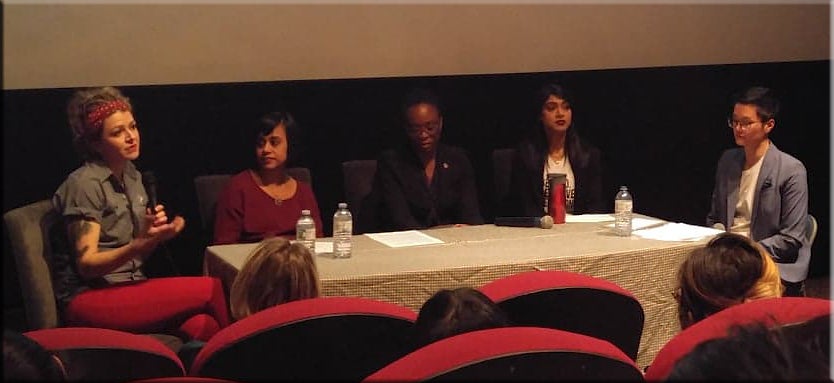
Being a female in the Science, Technology, Engineering, and Math (STEM) field is one of the most difficult undertakings, with many barriers that women have to overcome to succeed. The Waterloo Centre for Automotive Research’s (WatCAR) own Stefanie Bruinsma had an amazing opportunity to share her experiences within the engineering industry on panel at The Everyday Wonder Woman: Panel Discussion and Movie Screening event hosted by University of Waterloo’s Women in Engineering on March 8th, 2018 at the Princess Twin Cinemas in Uptown Waterloo.
As a former mechanic, powertrain researcher, engineer-in-training, and lead of the Green and Intelligent Automotive (GAIA) research facility, Bruinsma had a unique take on the obstacles that she had to overcome to get to where she is today. Having grown up within a difficult atmosphere, Stefanie looked within herself and for support elsewhere in order to find her interests. Stefanie developed in her head her own idea of what a woman in engineering would like, as she did not really have an actual example to focus on.
Stefanie also found a mentor in her high school automotive teacher, who often encouraged and challenged her with projects. She feels that his focus on her helped to guide her toward a path where she has found success. This path that has allowed her to not only be one of the few women working in the engineering sector, but to also lead and manage the day-to-day operations of the GAIA research facility.
The even more amazing part, is that Stefanie did all of this, schooling and becoming a respected worker, while balancing the duties of being a mother to a young child. “There is all this pressure to be a great mother and a great engineer. I have to remind myself that it is okay to go ask for help,” proclaimed Bruinsma.
Joined by three other amazing women on the panel, Ajoa Mitah (professional engineer turned ice cream entrepreneur), Bardish Chagger (Liberal MP for Waterloo), and Nandita Basu (Associate Professor, Civil Engineering at the University of Waterloo), the ladies were asked a series of questions about their experiences throughout there studies and subsequent careers.
One question was related to the feeling of being an imposter in your field because you are a woman. Bruinsma responded with, “At the beginning at my adventure I had to be an imposter to get accepted. I found out very quickly that I had pretend to be someone I wasn’t, so that I could get people to give me a chance. I would go off to whatever shop I was working at, at the time, that I would dress very man-like. Take off the make-up, take off the face, make sure my hair was done up. Not show that I was a girl, so that they could look at me as someone who was capable of doing it.”
Even after all the schooling, obtaining the appropriate credentials, and receiving a license, despite getting a pass in some areas, Stef still found much opposition. “Still if I was dressed up in normal conversation, I would meet people. I would be introduced as “This is my friend Stef, she’s a mechanic,” and they would be like “oh, really?” And they would start giving me questions, “let’s challenge that,” because they just wouldn’t accept it,” Bruinsma explained.
These unfortunate encounters often found Stef in some doubt. “I often found myself questioning. I always have to go back to that, and I love the comment about find the community not just to raise your children, but to raise yourself. Find the people that do believe in you. At the end of the day, there are always going to be people that tear you down. Find your sisters, find your girlfriends, find your partner. Someone who is going to say “You are incredible.””
Prior to the screening of Wonder Woman, the panel was asked what they thought of regarding the island of Amazons. “I love this part of the movie, because it’s sisters. This bond that these women have, I would love to emulate that,” Bruinsma declared.
She further went onto speak to the often-negative behaviour women can have with each other. “Of course, I grew up in this society, and I did grow up to comparing myself to other women. The back talk conversation. I am sure we have all had these experience, whether we are men or women, hearing women talk about other women behind their backs or being guilty of it yourself.”
However, Stefanie has decided to be proactive by taking steps to improve these relations. “There a few things that I decided to do to change myself and my views. I’m trying to change myself, so that I can lead and hopefully have a good example of those next to me. A couple of the things I liked to do is stop criticizing other women about what they wear. When I see another woman, I like to first tell myself, ‘Find something about them that you like about them.’ Look at another woman and find something you like about her. Try doing that first. The other thing I like to try to do is, when I see a little girl, I want to stop telling them how beautiful they are. I want to tell them how smart they are. How funny they are. I want to stop using the word bossy. We use that a lot with little girls. She’s not bossy, she has leadership potential. You got a voice and I love it.”